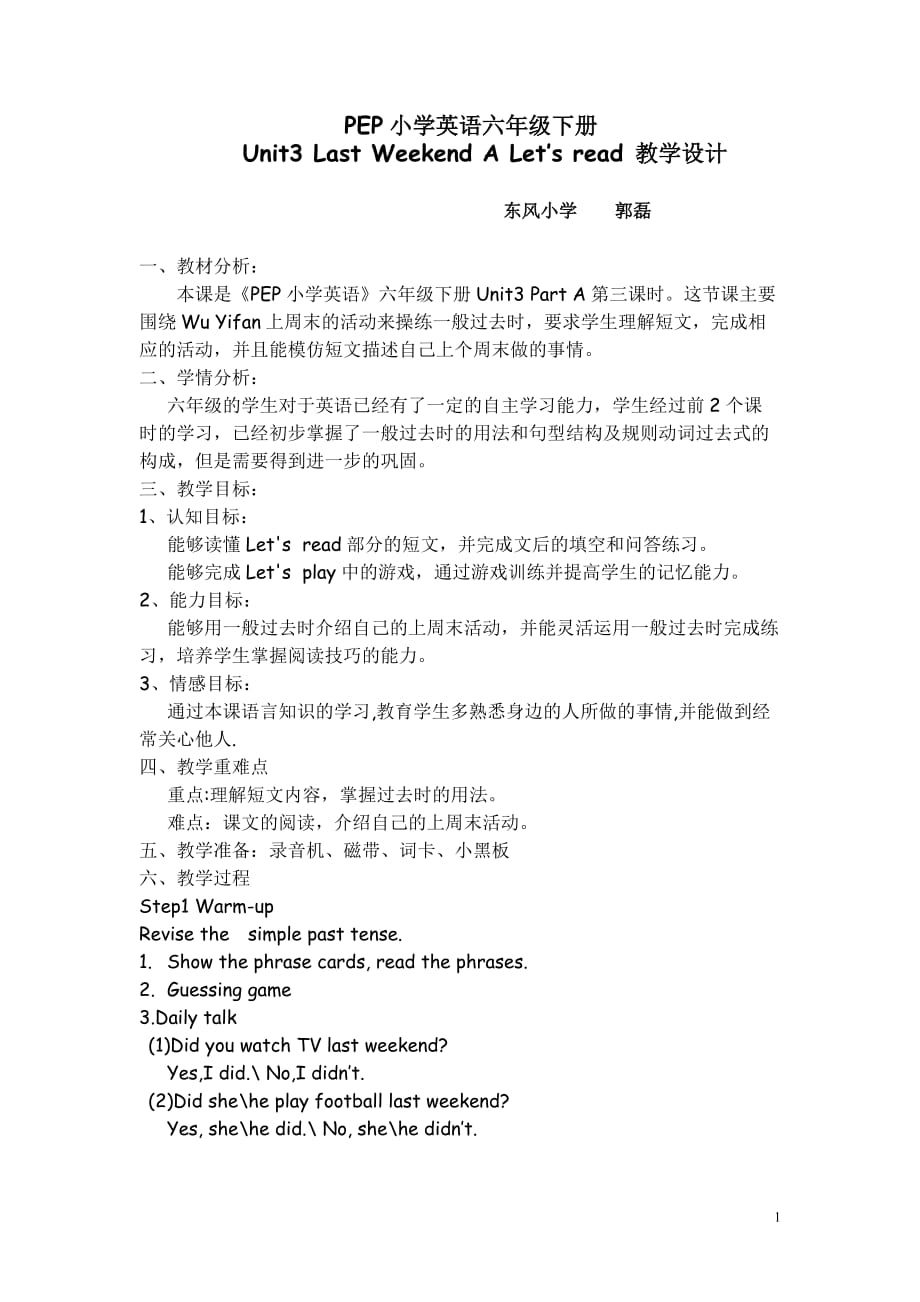《PEP小學(xué)英語(yǔ)六年級(jí)下冊(cè)第三單元Let'sread教案》由會(huì)員分享,可在線閱讀����,更多相關(guān)《PEP小學(xué)英語(yǔ)六年級(jí)下冊(cè)第三單元Let'sread教案(3頁(yè)珍藏版)》請(qǐng)?jiān)谘b配圖網(wǎng)上搜索。
1、
PEP小學(xué)英語(yǔ)六年級(jí)下冊(cè)
Unit3 Last Weekend A Let’s read 教學(xué)設(shè)計(jì)
東風(fēng)小學(xué) 郭磊
一����、教材分析:
本課是《PEP小學(xué)英語(yǔ)》六年級(jí)下冊(cè)Unit3 Part A第三課時(shí)。這節(jié)課主要圍繞Wu Yifan上周末的活動(dòng)來(lái)操練一般過(guò)去時(shí)��,要求學(xué)生理解短文���,完成相應(yīng)的活動(dòng)����,并且能模仿短文描述自己上個(gè)周末做的事情��。
二�、學(xué)情分析:
六年級(jí)的學(xué)生對(duì)于英語(yǔ)已經(jīng)有了一定的自主學(xué)習(xí)能力,學(xué)生經(jīng)過(guò)前2個(gè)課時(shí)的學(xué)習(xí)���,已經(jīng)初步掌握了一般過(guò)去時(shí)的用法和句型結(jié)構(gòu)及規(guī)則動(dòng)詞過(guò)去式的構(gòu)成�����,但是需要得到進(jìn)一步的鞏固����。
三、教學(xué)目標(biāo):
1����、認(rèn)知目標(biāo):
能夠讀懂Let
2、s read部分的短文�����,并完成文后的填空和問(wèn)答練習(xí)���。
能夠完成Lets play中的游戲�����,通過(guò)游戲訓(xùn)練并提高學(xué)生的記憶能力。
2�����、能力目標(biāo):
能夠用一般過(guò)去時(shí)介紹自己的上周末活動(dòng)�,并能靈活運(yùn)用一般過(guò)去時(shí)完成練習(xí),培養(yǎng)學(xué)生掌握閱讀技巧的能力����。
3����、情感目標(biāo):
通過(guò)本課語(yǔ)言知識(shí)的學(xué)習(xí),教育學(xué)生多熟悉身邊的人所做的事情,并能做到經(jīng)常關(guān)心他人.
四���、教學(xué)重難點(diǎn)
重點(diǎn):理解短文內(nèi)容���,掌握過(guò)去時(shí)的用法。
難點(diǎn):課文的閱讀����,介紹自己的上周末活動(dòng)。
五����、教學(xué)準(zhǔn)備:錄音機(jī)、磁帶��、詞卡���、小黑板
六����、教學(xué)過(guò)程
Step1 Warm-up
Revise the simple pa
3�、st tense.
1. Show the phrase cards, read the phrases.
2. Guessing game
3.Daily talk
(1)Did you watch TV last weekend?
Yes,I did.\ No,I didn’t.
(2)Did she\he play football last weekend?
Yes, she\he did.\ No, she\he didn’t.
Step2 Preview
Let’s play
T:What did you do yesterday?
S1:I did
4���、 my homework
S2:I did my homework,washed the clothes.
S3:I did my homework,washed the clothes,played football……
T:Did you feel tired?
S3:Yes,I did.
T:Ithink I was tired and busy too.
Teach‘was’and‘busy’
Step3 Presentation and practice
Let’s read
T:Yesterday was a busy day.In the morning
5、 I cooked breakfast and went to work. After working, I went shopping,cooked lunch. In the afternoon Iwashed the clothes, cleaned the room,and cooked dinner. In the evening I read books. I was very tired,too. Do you think so?What about Wu Yifan’s last weekend?
1. Listen to the tape
2.Ask and answer
6���、 about the passage.
3.Read the passage by themselves. Then finish the exercises.
4.Listen and repeat
5. Retell the passage.
6.Ask some students to say the activities last weekend.
Step4 Extension and Consolidation
1.Do the exercises
短文選詞填空�����。
go cooked was in on goes tired vis
7��、ited washed cleaned watched next
My mother ______ busy last weekend. She _______ my grandma Saturday morning. They ______ noodles together. ______ the evening, she ______ the clothes. She often ______ to the park, but she ______ my bedroom last Sunday. In the afternoon, she went shoppi
8����、ng. She ______ TV with me in the evening. She was very ______ last weekend. So I’ll help my mother do housework ______ weekend.
閱讀理解���。
Mike was busy last weekend. He cleaned his room Saturday morning. He went to a supermarket with his mother in the afternoon. In the evening, they watched TV. Sund
9�、ay morning, Mike did his homework at home. In the afternoon, he played football with his friends.
根據(jù)短文內(nèi)容完成下列各題����。
(1).What did Mike do Saturday morning?
_________________________________________
(2).Did he go to a supermarket last Saturday?
_________________________________________
(3).What did
10�、he do Sunday morning?
_________________________________________
(4).Did he go hiking last weekend?
_________________________________________
2.Write a passage about the activities last weekend.
七、教學(xué)板書
Unit3 Last Weekend A Let’s read
Wu Yifans Weekend
Saturday morning ………visited his grandm
11�����、other
Saturday evening ………watched TV
Sunday morning ………played football
Sunday afternoon ………washed his clothes
cleaned his room
八、教學(xué)反思
本節(jié)課我通過(guò)創(chuàng)設(shè)情景����,讓學(xué)生先用上節(jié)課已學(xué)過(guò)的知識(shí)談?wù)勛约褐苣┑幕顒?dòng),達(dá)到復(fù)習(xí)舊知識(shí)的目的��,同時(shí)導(dǎo)入新課���。學(xué)習(xí)新課時(shí)����,我主要是引導(dǎo)學(xué)生�,讓他們通過(guò)個(gè)人思考和小組合作的方式,完成教學(xué)任務(wù)���。在教學(xué)中�����,大部分學(xué)生都能順利完成學(xué)習(xí)任務(wù)�����,但對(duì)于基礎(chǔ)較差的學(xué)生卻有一定的困難�。在以后的教學(xué)中,小組合作學(xué)習(xí)時(shí)���,一定要安排學(xué)習(xí)較好的學(xué)生多去幫助他們����,同時(shí)在平常的教學(xué)中�,多給予他們鼓勵(lì)和信心,讓他們喜歡上英語(yǔ)�。在操練和鞏固環(huán)節(jié),設(shè)計(jì)的作業(yè)較多�����,學(xué)生沒有完成���,所以練習(xí)應(yīng)精練����。
3
 PEP小學(xué)英語(yǔ)六年級(jí)下冊(cè)第三單元Let'sread教案
PEP小學(xué)英語(yǔ)六年級(jí)下冊(cè)第三單元Let'sread教案

